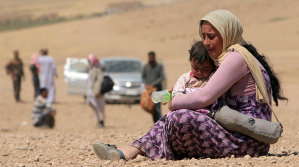
Controversial Christian blogger Matt Walsh has written a column urging fellow Christians in the United States to stop being "lazy cowards" in the face of persecution. He had several solutions to combat that apathetic attitude.
His column, which has been posted on The Blaze, first turned to the atrocities ISIS has committed against Christians in the name of Islam. Walsh contended that Christian "persecution" in the U.S. was nowhere near the levels others have faced around the world.
"It might be hard to believe this kind of persecution happens in the world, especially when the American version of 'persecution' includes not having access to gender neutral bathrooms," Walsh wrote. "Out there, people face the very real threat of death and dismemberment if they practice the wrong religion. Here, we whine if a toilet stall feels too exclusionary. Talk about privilege."
Even with that perspective in mind, Walsh contended that 100 million Christians faced "the daily prospect of violence, intimidation, coercion, oppression, imprisonment and martyrdom." Those numbers would make Christians, in his view, "the world's most persecuted people" today.
"Believers are being blown up, incinerated, shot, and beheaded in Iran, Pakistan, Afghanistan, Iraq, Syria, Saudi Arabia, Ethiopia, Somalia, Nigeria, Sudan, Egypt, Libya, and many other nations," Walsh wrote. "And this isn't relegated solely to Islamic State-controlled countries, or even to Muslim ones."
The blogger added that North Korea and China are also some of the top countries when it came to persecuting Christians; both countries adhered to "godless" Communist systems. Walsh noted that there are fewer safe places for persecuted Christians to flee to in the world.
"Our foreign policy has contributed enormously to the problem, despite what you may hear about our dedication to helping 'oppressed people' around the world," Walsh wrote in regards to U.S. government policy. "Our government sent weapons and money to Muslim 'rebels' in Egypt, Libya, and Syria, and in each case those dear friends and allies of the U.S. turned around and murdered Christians in droves."
Walsh asked fellow Christians what can be done to counter the persecution faced around the world. He presented two solutions: prayer and "material support."
"Sometimes we forget that prayer isn't some kumbaya exercise in sending good vibes in someone's direction," Walsh wrote. "It is, instead, a supernatural weapon for good. Prayer works. We should pray."
The blogger added that Christians can also "lend material support to organizations that are out there trying to help these people." He also had another solution in mind.
"We can honor their courage and sacrifice by not being such lazy, selfish, apathetic, cowards," Walsh wrote. "In dozens of countries around the planet, Christians go to church, read their Bibles, and profess their faith fully aware that these decisions might get them killed."
Walsh compared the attitudes of Christians in the U.S. with those from around the world. He noted that anti-Christian sentiment in the Middle East "often involves being dragged out of your home, beaten, burned alive, and hung from a bridge."
"Here [in the U.S.], many Christians frantically skim through the Bible discarding every piece and part that doesn't suit the modern lifestyle," Walsh wrote. "We sit up on a perch like gods and construct a new religion for ourselves. While our fellow believers many miles away are marched out into the desert and massacred for believing in the Word, we abandon the Word entirely if it threatens to put a damper on our sex lives."
The blogger emphasized that he was not portraying himself "as a perfect example of a courageous American Christian." However, he challenged all Christians to consider whether or not they would continue professing faith in Jesus in the face of real danger.
"That's a question you have to answer for yourself, just as I have to answer it for myself," Walsh wrote. "And if you want to do something about the persecution of Christians, this is a good place to start."






